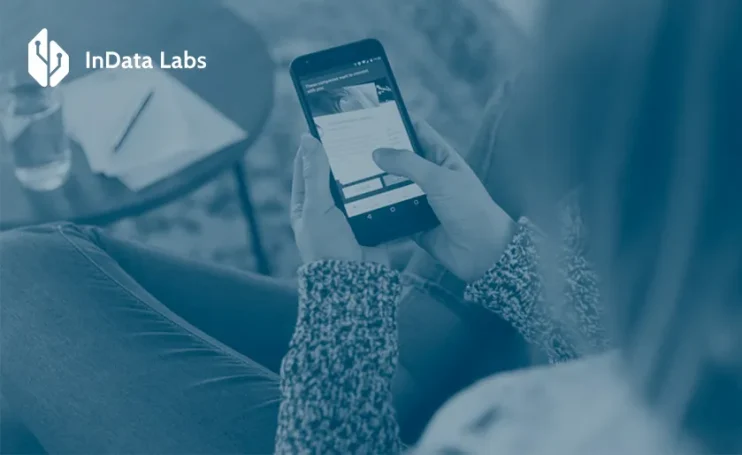The technology has boosted the growth of each industrial sector around the world. One of those sectors is healthcare, which has seen a remarkable elevation in recent years. The rise of technologies like ML and AI has also shown many promising prospects in healthcare. One of them is the scope of AI in Mental Health.
From diagnosis and interpretation, to monitoring and assistance, the AI-backed and intelligent machine learning tools are creating a promising scenario. The technology that mimics human cognitive behaviors can understand human mental states and offer solid AI solutions for healthcare.
And these have appeared in the form of AI-based apps along with mHealth and telehealth. How effective they are and what AI can do for mental health is something to look forward to.
Let’s talk about the AI need and essentiality in the treatment of mental health.
Why Do We Need To Address Mental Health?
According to an estimate, 10 percent of the world’s population is battling mental health issues. And this figure doubles up for children and adolescents. More startling figures come from countries with permanent conflict and violence. In these places, one in five is living with mental health disorders. And, some segments face more of such problems.
The foray of technology into the health sector is seen as a boon by many. One of the most promising is Artificial Intelligence (AI). The technology has shown some encouraging results in the medical field in the past. AI can assist in diagnosing diseases, interpreting medical images and also advising on treatment plans.
This is significant as patients do not get much time with health professionals. They often stay remote for the need of an appointment. That was well illustrated by Peter Foltz in his research paper. The meetings happen once in three or six months. This vast gap can turn devastating for an individual suffering from a mental health disorder. Such discrepancies in rendering mental health care and treatment calls for better intervention. And AI is the right tech to do it.
Artificial Intelligence in Behavioral & Mental Health Care
Artificial Intelligence has several roles to play apart from facial recognition for healthcare, including:
- Diagnosis
- Monitoring
- Treatment
- Balancing workload of doctors
- Data security, privacy and consent
- Clinical governance
The current data collection happens in two ways:
- Non-Artificial Intelligence
- Artificial Intelligence
Non-Artificial Intelligence may be inaccurate, whereas AI is way better on such terms.
Artificial Intelligence can be placed under three broad categories. Weak or narrow AI, strong or general AI, and artificial superintelligence. So far, our scientists have achieved weak AI only, and we have witnessed businesses gain from the speed and efficiency provided by the AI.
Why Does Mental Health Need AI? Diagnosis? Mental Health Patient Assistance? More?
In some mental conditions, quick intervention should happen. Unfortunately, that doesn’t happen and leads to devastating aftermaths. AI can provide a great alternative in mental health care and cure. You may wonder if it is useful? What is its relation to psychology, if at all?
AI and mental health is a newly wedded biomedical relationship. The psychiatry involved in treating mental health issues requires a significant amount of emotional intelligence. Let’s admit, machine-learning applications in healthcare can never match that, yet it can assist in different ways:
- Analyzing facial data
- Understanding patterns with the in-built scripts
- Worsening of symptoms

Source: Unsplash
Artificial Intelligence in Behavioral and Mental Health Care
Researchers believe artificial intelligence and psychology are closely linked. This technology is based on human brain neurons. These nerve cells can form connections due to human perception and stimuli that are further transferred using chemical and electric signals. This permits adaptive learning.
AI mimics human neurological functions, i.e., how human cognitive thinking happens. This ability to emulate human behavior is widening the scope for AI and its application in psychological treatments.
You may wonder, how?
The technology is designed to think and create natural language processing (NLP), making it possible for AI to communicate. A thinking machine can process information akin to human cognitive thinking, solve problems, decide, and reason. It uses coding algorithms for programming, helping to decode, interpret data and make future predictions.
Can it replace humans?
That said, it is difficult to replace psychiatrists completely as AI is merely a machine processing scripted to work a certain way. It does not have the emotional ability or conscience of a human mind. It can be made to work like humans, but it has its limitations, leaving scope for more advancements.
Artificial Intelligence and Mental Health Care
Now the question arises, can AI be used for assessing mental well being? Is it feasible? Is it useful?
Artificial Intelligence advancement has enabled computer-assistance for psychiatrists. They are now capable of detecting a disease and keeping a check from any location. Not just this, they can do much more.
To illustrate further, the University of Colorado Boulder researchers worked on a speech-based mobile app to understand mental illness patients’ cognitive behavior. The main reason for conducting this study was recurrent errors by humans.
No human is perfect. A psychiatrist can miss warning signs or some speech cues. Foltz and Elvevag came together to build an app that could detect or recognize everyday speech and emotional changes. And on this basis, solid predictions about the wellbeing of a patient can be made.
How Does the App Work?
In schizophrenia, if the sentences uttered do not follow a logical pattern, this indicates an acute symptom. Any shift in pace or tone indicates depression or mania. Aso, memory loss can tell about both mental and cognitive health problems.
“Language is a critical pathway to detecting patient mental states,” says Foltz. “Using mobile devices and AI, we are able to track patients daily and monitor these subtle changes.” Just like this, the uses of artificial intelligence in mental health are in plenty.
mHealth and Telemedicine
With the rapid advancement in wearable devices, mHealth and telemedicine are gaining a strong foothold. Wearable devices and smartphone apps bring in a massive influx of data. This makes machine learning development or specific healthcare app development important. Several software developments are happening for this purpose.
How Are AI Apps for Mental Health Used?
Generally speaking, AI-enabled mental health applications can be used to function in three different ways:
- A support tool for mental health practitioners
- Customize patient interface for one-to-one counseling with the help of a human therapist
- Patient interaction with “virtual assistant.”
What Are the Benefits of AI in Mental Health?
With 40% of Americans with no access to mental health professionals, COVID-19 has only added to the existing problem. AI apps for mental health can bridge this growing requirement. Out of the many benefits it entails, we have listed a few of the most critical and most effective ones here.
1. Saves Administrative Costs on Screening of Patients
A report published in the Journal of the American Medical Association (JAMA) suggests that nearly half of the administration’s health care expenses are allocated on making plans, regulations, and medical services management. A hospital can reduce expenditure by employing AI services.
Applications of AI in mental health seek answers by asking patients a series of questions on the phone. They are also questioned about their mental state or asked to tell a story or listen to a story and repeat it. Besides, a touch-and-swipe test analyses their motor skills.
After that, they can analyze the data and save time and cost otherwise needed to be done by humans.
2. Make Workflow Much Quicker and Optimized
AI-aided data analysis helps mental health professionals diagnose faster with very little room for errors. So, the treatment can start quickly. The application of AI in mental health makes remote monitoring possible with timely alerts to prevent gaps between the appointments and keep all improvements up-to-date.
3. Optimize Doctors’ Time to Treat More Patients
AI is helping doctors have some extra time to accommodate more patients and offer them their expert advice. How?
Doctors from the mental health facility use AI-based technology in three different ways:
- Analyze patient condition by going over the discussion
- Store the necessary information into the system
- Take notes
AI applications collect and analyze patients’ data. It is further shared with the doctor along with the patient’s medical requirements. This saves time for doctors, and they can treat more patients.
4. Attract More Patients via Apps and Telehealth
Unfortunately, there is a kind of stigma attached to mental health even now. Mentally unwell patients often shy away from seeking psychiatric help. They even stay away from speaking about it. Statistics regarding this is encouraging. Consequently, the mental well-being market is expected to reach US$ 3918.40 by 2027.
The good news is that AI-powered applications target mentally unwell individuals and are attracting more people in recent times. Similarly, the high cost of mental health care, web-based technologies such as telehealth is an effective alternative and has gained momentum.
In telehealth, a client and therapist can communicate to:
- Share resources
- Work on coping methods
- Discuss new routines
- Communicate worries and fears

Source: Unsplash
What are the Negative Effects of AI?
One cannot deny the several remarkable advantages of AI and its applications. However, the same technical advancement has some downsides as well. Let us go through some of the adverse effects of AI one by one.
Unbiased Behavior
Amazon accepted the problems it faced with the AI process. Since the AI was human-built, the employers made sure the AI avoided recruiting minorities and highly qualified women. The recruitment algorithm was biased and faced discriminatory allegations so much so that it was removed.
Privacy Invasion
Another negative impact of AI is due to facial recognition algorithms. As the cameras are installed everywhere these days, it has become extremely simple for tracking people. China’s social credit system poses a similar threat. An AI that records your smoking, non-smoking areas, and even playtime is a clear invasion of privacy.
Unemployment
According to a report published in the World Economic Forum, by 2022, AI would have created 58 million new jobs and is estimated to remove 75 million jobs. The impact will be felt more with the low skilled jobs. Also, the jobs that involve repetitive work are at higher risk. To combat the same, humans need to reskill or upskill to survive in the AI world.
Disproportional Control Over Data
Most large companies are investing in AI-powered systems. And this development is happening at the scientific, commercial, and product development level. This provides organizations with an unmatched advantage over the smaller companies who have not ventured into AI yet with more control over data.
Security
The most disastrous of all is AI’s role in security. Autonomous drones, remote attacks, robotic swarms and disease delivery through nanorobots are the perils human civilization may face with AI advancements.
To prevent it, humans need to intervene, and draw a line. This must happen before the AI deployment.

Source: Unsplash
Can AI replace psychiatrists?
Sermo did a global survey with 791 researchers from the Harvard Medical School and Duke University School of Medicine in 22 countries. They were asked to evaluate the possibility of AI replacing and not merely assisting human psychiatrists in the future.
At the end of the survey, only 3.8 believed that AI could replace the human role in future. However, most researchers concluded that it is nearly impossible to replace human touch in treating a patient psychologically.
The psychiatrists cited examples such as homicidal thoughts (58 %), prescribing personalized treatment (53 %) and collecting medical histories (58) as impossible tasks for AI.
On the contrary, the participants in the survey felt that AI can take over the human role in analyzing patient information for diagnosis (54 %), and maintaining patient records (83 %).
All in all, even the medical fraternity is skeptical about the extent of AI application in the future. It will most likely depend on advancement. Therefore, the answer to this question, “Can AI replace psychiatrists?” is ‘Yes’, but not in all cases, and not under all scenarios and yes, it comes with certain limitations.
For instance, we should expect AI-based technology to work in tandem with psychiatrists. This will help both medical professionals and clients with the automation of the initial interaction.
Also this saves time for psychologists to pay attention to several complexities involved in the treatment process. Not only that, AI makes it easier for individuals to open up about the emotional distress, which isn’t easier when interacting with a human.
The above said shows us that AI is already helping the medical field. Several experiments going on the world over. However, the success of these will perhaps divide AI’s role in the times to come.
Summing up
And all this is possible with only the first application AI type. Wonder what the scenario will be like when we achieve advanced AI for mental health or artificial superintelligence. We can certainly rely on machines for what humans are not capable of. Rest it remains to be seen where the future advancements take us. Nevertheless, the medical sector will surely benefit from this.
Uncover the Benefits of AI for Mental Health Apps
Have a question about using AI for mental health treatment? Or want to know about the current state of AI in the healthcare industry, what trends exist, and how this technology combats the COVID-19? Download free infographic here.
